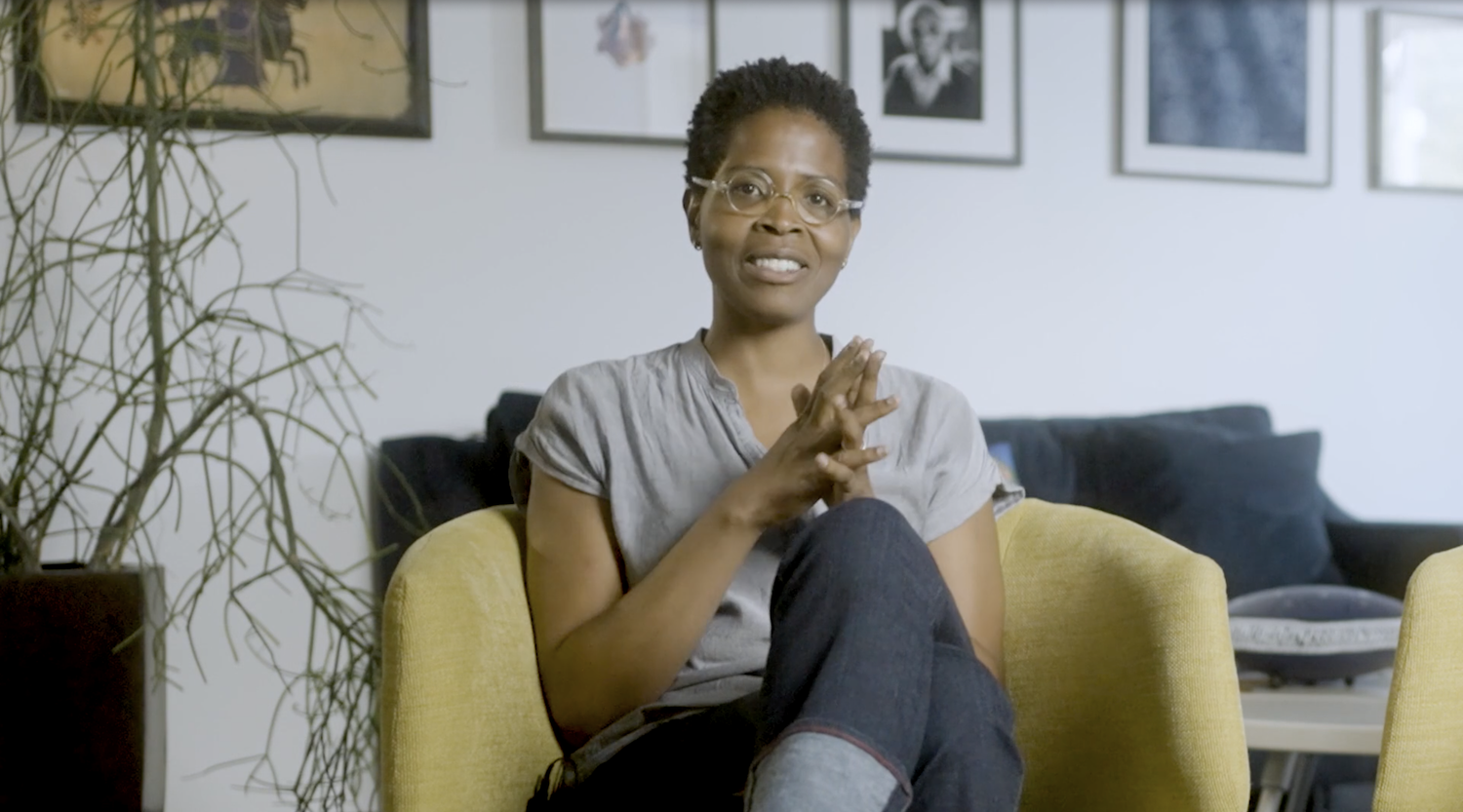
Rooted in the Body with Arisa White
As a poet who often writes about mental health, I get upset whenever I hear the phrase, “It’s all in your head” or the phrase, “Get out of your head.” I have been told to repress what has been in my head so much in this short life that I have the need to defend it with vigilance. However, by protecting only what is in my mind, I have spent little time with my body. I have spent little time with my obsessive compulsive disorder-ridden mind’s relationship to my Black multiracial queer nonbinary body.
My appreciation for poets who encourage us to engage with our bodies has increased multifold in recent years. Arisa White is a poet who encourages us to engage with our bodies wholeheartedly, and it was wonderful witnessing her engagement with us as Indigo Arts Alliance’s 2022 summer Artist-In-Residence.
I had the opportunity to engage in community with Arisa at the Words of Fire Retreat in September 2021, a retreat organized for Maine-based and other New England-based writers of color who are also of marginalized genders. There were three lead workshop facilitators that year.
Valeria Bembry facilitated a workshop on how art criticism talked about marginalized bodies in art, and created a space for us to ask questions about the lens each critic portrayed.
Signature MiMi, who was Arisa’s mentee during her fellowship time, facilitated a writing workshop which involved painting with our feet in order to encourage us to write with our bodies before our minds; most writing settings have taught us to write the other way around. Arisa said, “I loved MiMi’s willingness to go with the flow. To be moved by spirit and feeling and [to let]that be the direction for the day. Our mentorship helped me to relax into my own flow; to find my flow again. And in finding it, I reunited with an aspect of my aliveness, with my own unique way of being, and all without that need to correct, control, and temper. I relaxed into being—into being with the feeling, sensation, desire, and the possibility unannounced. And in doing so, I became more present in the moment. I wanted to occupy the moment more fully with a fuller sense of who I am and what I can bring and share.”
Arisa facilitated a workshop on hair braiding and writing, where many of us talked about who taught us how to braid, what visuals of braiding we wanted our poems to reflect, and how hair braiding embodies touch and feelings.
Arisa’s workshop made space for us to feel the senses and talk about the discomforts that rose within our bodies when talking about the expectations around our hair. As with all of the workshops she facilitates, she also led us in the direction of picking a title for each of our pieces of writing – a practice I greatly admire. It’s an honor to know she got to utilize similar somatic practices in her workshop “A Practice of Residing in Your Own Humus Soil” in July 2022.
Arisa described participants’ feedback from the workshop as “thankful for the unconventional ways I help them generate material. Something as simple as using the letters of your names—rearranged and reimagined—to answer their own questions or find images to spark the writing of longer pieces. Ultimately, what I try to get at in my workshops is that you have your own answers—if you can be a better witness to yourself, your process, your experiences, there is always a route to inspiration. And that inspiration is you!” Her residence encouraged nourishment and reflection of the full self; not just the self from our minds.
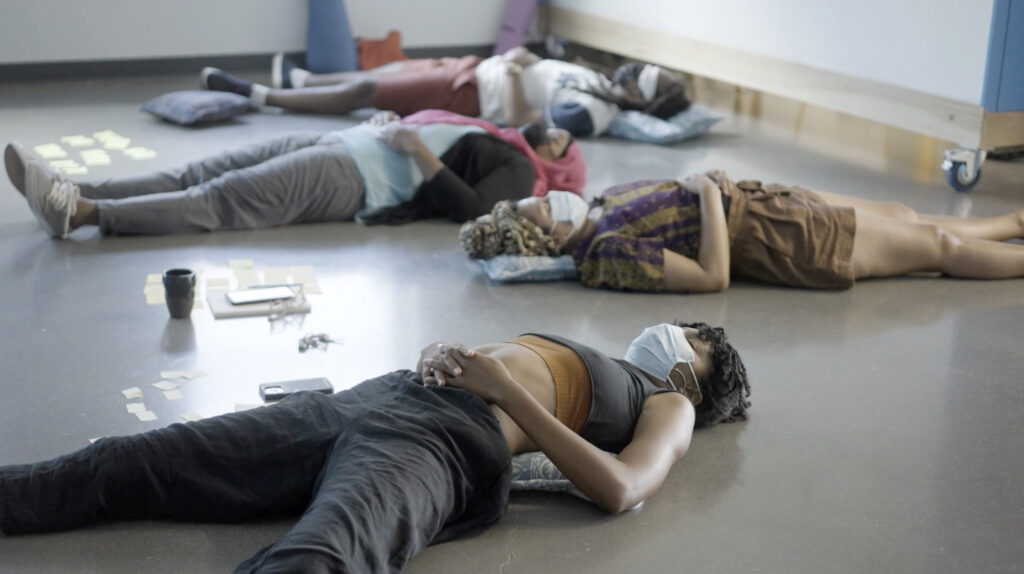
Arisa’s presence not only thrives in how she orchestrates other’s writing, or in her own writing on the page either – her presence also thrives on the stage. She created a staged performance inspired by her poetic memoir Who’s Your Daddy? in November 2021. Her poetic memoir is about her journey finding herself in her Black Guyanese American queer body, while also navigating how to find what her relationship with her estranged father would look like.
The performance was held at Maynard F. Jordan Planetarium. What other best place for the senses other than under the stars? As I was driving home after the show, I kept wondering when I would get to see Arisa’s work on stage again. In July 2022, it finally happened!
Her Opera-In-Progress, or libretto, Post Pardon is based on her poetry chapbook published by Mouthfeel Press in 2011. It tells the story of intergenerational eco-activist organizing as well as healing from the trauma of a murder-suicide. I write a lot about suicide in my own work, and it was an honor and a privilege to read the part of Rema, the mother from the afterlife trying to heal her relationship with her living daughter and the child she killed before taking her own life.
Here is an excerpt from the prologue of the opera:
It is before sunset, and black birds are coming home to roost. There are dark clouds but no rain. An audible wind blows through the city of Windlyn. It sounds like a deep exhale is coming from the bottles, like someone is repeatedly whispering, “I’m in a state of emergency.”
Her skeletal fetus glowing amber, CHURAIL walks backwards from An Unforeseeable Future toward ELSA, THE BOTTLE TREE.
The bottles glimmer with faces of girls, women, femmes recently gone missing or murdered. Nia Love’s face is amongst them.
The four bottles with the spirits of Papa Earl, Nana Mae, Rema, and Isa flicker S.O.S. in amber lights. ELSA releases a flurry of acorns.
We see REMA in the wide trunk of ELSA, she is lip syncing “I‘m in a state of emergency.” At REMA’s feet: 32 notebooks open and strewn about, scraps and balls of paper, newsprint, cardboard, clothing of a 2-year-old, police badge, flowers, and a bloody knife.
CHURAIL lurks behind REMA as she writes in Notebook 33. She is voraciously, as if it is her breath. Her life. REMA is harried. Hurried. Anxious, however purposeful. That sense of purpose gives her presence a quality of neatness.
REMA stuffs everything at her feet into her womb. CHURAIL offers her the skeletal fetus, and as REMA takes it inside her, the slit on her left wrist is a ruby caterpillar alive.
CHURAIL fades away.
Arisa stated, “What was most rewarding about the opera-in-progress reading is that I finally got to hear the work out loud, coming out of the bodies of others. It was wonderful to see how the words themselves were embedded with characterization. Following the cadences of speech, the actors could easily imagine who they were inhabiting. Sharing your work, especially something in-progress, can be so self-conscious and to have the audience welcomingly receive it and say good things about it, is encouraging. At the point when the work is received, I experience my artwork as a service to others.”
Since her residency, Arisa has been able to reorganize her relationships and make big changes in the service of love. “Love can be the productive outcome of our lives coming together and evolving us. What continues to resonate with me [post-residency] is the laughter and feelings of belonging—that I can have a home here, in Maine, amongst a community of Indigenous, Black, and POC artists. I feel an expanded sense of myself and look forward to a deeper sense of rootedness.”
My excitement will not cease for whatever Arisa has in store next. I am grateful for her service to feeling rooted in ourselves and our bodies.
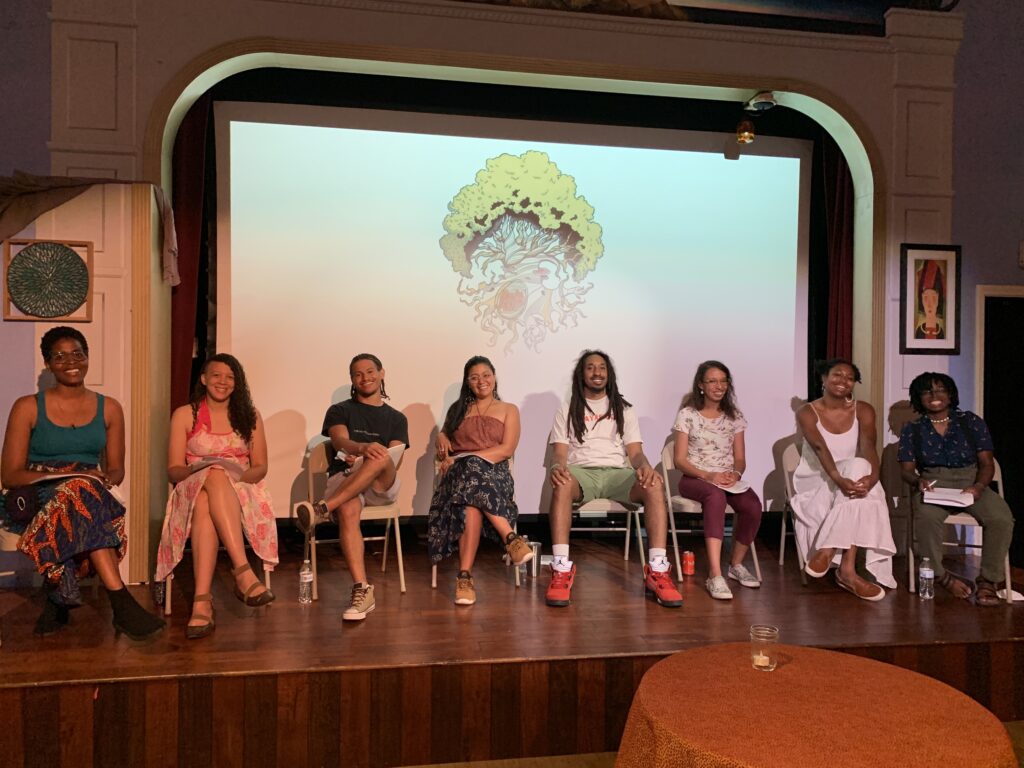
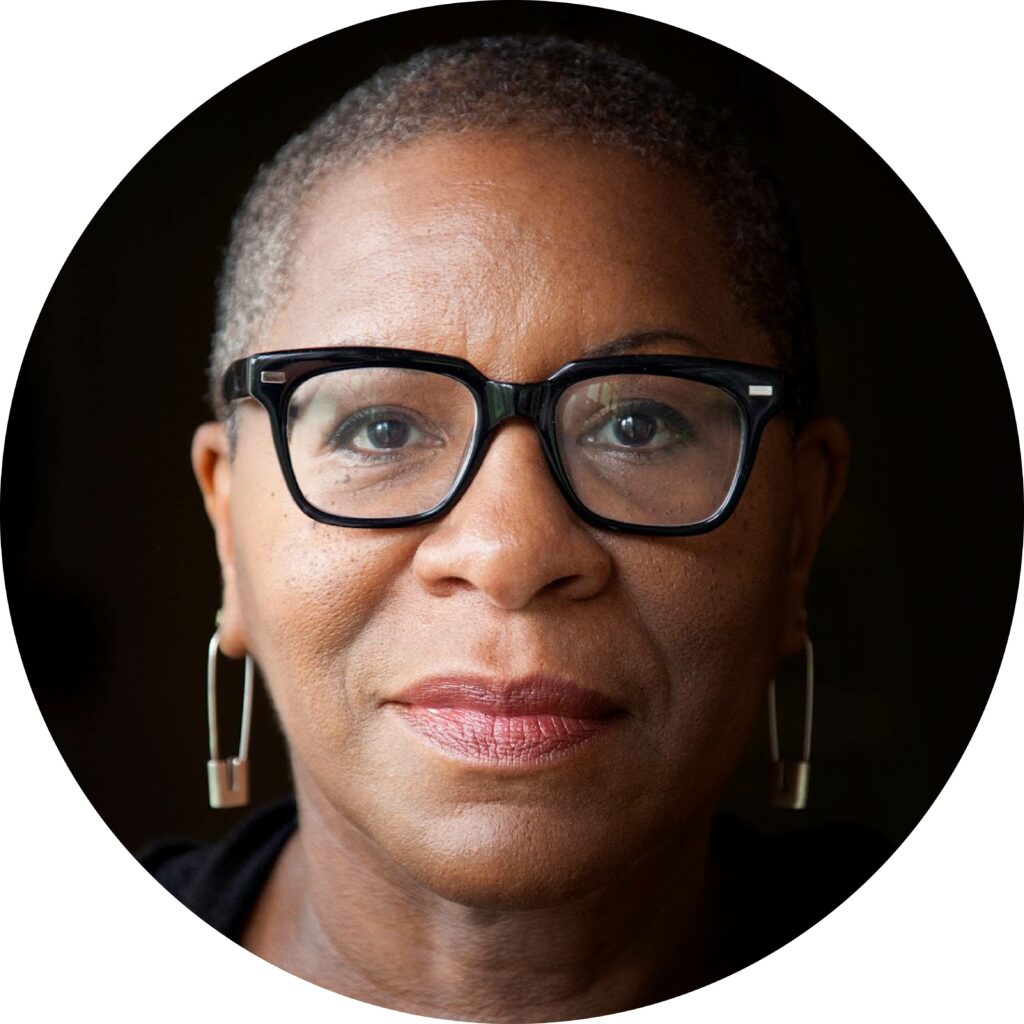
ARISA WHITE
Fo Wilson (Folayemi) is an artist/designer, educator, independent curator and writer. Her studio practice crosses interdisciplinary boundaries between the visual art, sonic media, a regard for the handmade, a background in design and object making, and an Afrofuturist expression of blackness. Wilson earned a MFA from the Rhode Island School of Design and is an Associate Professor at Columbia College Chicago. She was honored as a 2015 3Arts awardee, and received a 2016 Graham Foundation grant.
Wilson lectures about art, design and craft to international audiences, and her writing and reviews have appeared in NKA, Journal of Contemporary African Art, the International Review of African American Art (IRAAA), and Communication Arts. Wilson was the 2013-14 Inaugural Faculty Fellow at the Center for Black Music Research (CBMR) and has been awarded residencies or fellowships at ACRE, Anderson Ranch Arts Center, Djerassi residency program, Haystack Mountain Center for Craft, Kohler Arts/Industry program, Macdowell Colony, and Purchase College/SUNY Purchase New York. She has been a grant recipient of Creative Time, the National Endowment for the Arts, and the Propeller Fund, and her design work is included in the collection of The Cooper Hewitt National Museum of Design.
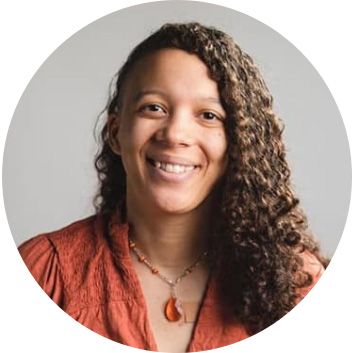
MAYA WILLIAMS
Maya Williams (ey/they/she) is a religious Black multiracial nonbinary suicide survivor who is currently the seventh Poet Laureate of Portland, ME from July 2021 to July 2024. Ey has published poems in venues such as The Portland Press Herald, The Cortland Review, FreezeRay, Indianapolis Review, Amjambo Africa!, glitterMOB, Maine Arts Journal, Black Table Arts, and more.
Their debut poetry collection Judas & Suicide will be published May 2023 and is available for pre-order now through Game Over Books. Their second collection Refused a Second Date will be published October 2023 via Harbor Editions. She has received residencies from Sundress Academy for the Arts (SAFTA), Voices of Our Nation Arts (VONA) Foundation, The For Us by Us Fund’s Words of Fire Retreat, Hewnoaks Artist Colony, and The Watering Hole. Maya was one of three artists of color selected to represent Maine in The Kennedy Center’s Arts Across America series in 2020, and was listed as one of The Advocate’s Champions of Pride in 2022. Maya also serves as MaineTransNet’s Community Care Program Coordinator, where they develop educational material on trauma informed trans cultural competency, provide outreach to incarcerated trans folks, and develop arts programming.
Edited by Samaa Abdurraquib
Samaa Abdurraqib is a writer and a poet living in Maine’s Midcoast. She is the editor of From Root to Seed: Black, Brown, and Indigenous Poet Write the Northeast (forthcoming). Her poetry can be found in Cider Press Review and Obsidian: Literature and Arts in the African Diaspora.